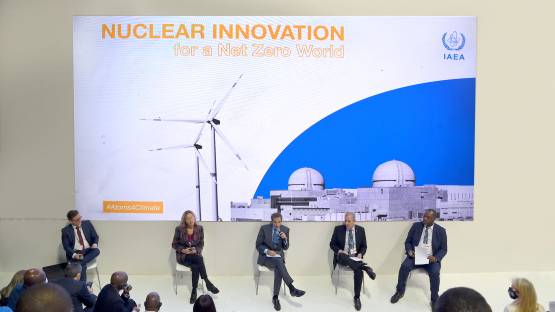Government ministers and industry leaders from Brazil, Ghana, Russia and the United States spelled out their plans for using nuclear energy to help slash emissions to net zero and achieve sustainable development in a wide-ranging conversation at the UN climate summit with IAEA Director General Rafael Mariano Grossi.
“Nuclear Innovation for a Net Zero World”, an IAEA side event at the United Nations Climate Change Conference (COP26) in Glasgow, United Kingdom, featured conversations on energy and development with energy ministers as well as the head of the UN Economic Commission for Europe (UNECE). Industry leaders including Sama Bilbao y Leon, the head of the World Nuclear Association (WNA), then engaged with Mr Grossi on the ways in which nuclear power innovations, including in financing and construction methods, can help to expand global access to clean and reliable energy.
“People are approaching the issue of nuclear’s contribution to climate change from a more objective perspective, with a much better disposition… We all know that without the current contribution of nuclear, the figures, the stats, the graphs would be much worse than they are… The voice of nuclear had to be heard, is being heard and will continue to be heard,” said Mr Grossi.
Thirty-two countries operate nuclear power plants, which provide 10% of the world’s electricity and more than one quarter of all low-carbon electricity. Nuclear power generation capacity will need to at least double over the next three decades if the world is to limit the average global temperature increase to well below 2 degrees Celsius as called for by the Paris Agreement, according to the four model scenarios by the Intergovernmental Panel on Climate Change as well as studies by the International Energy Agency (IEA).
To get there, the IEA estimates that nuclear power will need to significantly expand beyond its traditional markets in the developed world to include developing countries in Africa, Latin America and Asia.
Bento Albuquerque, Brazil’s Minister of Mines and Energy, told the audience that the country’s 30-year energy plan calls for the addition of 10 gigawatts of new nuclear power. And currently, some 30 so-called newcomer countries are considering or embarking on nuclear power, with Belarus and United Arab Emirates recently starting up their first reactors and Bangladesh and Turkey well advanced in constructing their first plants.
The IAEA supports newcomers such as Ghana in their efforts to develop the infrastructure needed for a safe, secure and sustainable nuclear power programme. “The president has declared to Ghanaians that we want to go down the path of nuclear,” said Ghanaian Energy Minister Matthew Opoku Prempeh. “And the reason is simple: our baseload can no longer be sustained by hydropower, so we need other low-carbon forms of energy for our baseload and the right way to go and the cleanest form is nuclear. With the support of the IAEA, with which we work cooperatively and closely, we are on the path to get us there,”
United States Energy Secretary Jennifer Granholm said the US is “all in on nuclear” as part of its ambitions to achieve 100% clean electricity by 2035. She said the US would pursue a “broad technology umbrella” including all low carbon sources, and nuclear would need to play an important part, since it already provides 20% of US electricity and more than half of the country's clean electricity.
She added that the US would focus its investments on long term operation of existing reactors as well as on emerging technologies such as advanced small modular reactors, which have the potential to provide a transition for communities that currently rely on fossil plants.
Nuclear energy is the answer to an efficient energy transition, said Alexey Likhachev, Director General of Russia’s State Atomic Energy Corporation Rosatom (ROSATOM).
“The move to build an nuclear power plant is more than just a demand for clean energy – it means new jobs, new education, contracts for local industry, economic growth, and an improved quality of life for people in general.”




